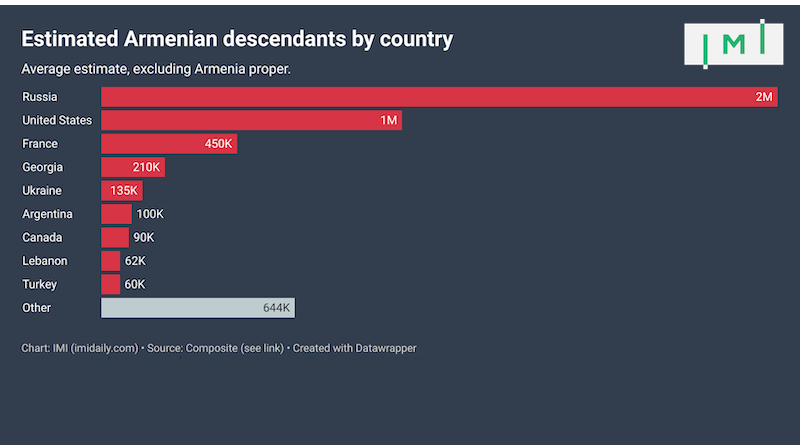Up To a Million Americans May Qualify for Armenian Citizenship by Descent

Nerses Isajanyan
Yerevan
Armenia, a nation steeped in cultural heritage and historical significance, provides individuals of Armenian descent with a pathway to citizenship, reconnecting them with their ancestral roots. In 2022, the Armenian Migration and Citizenship Service processed 25,515 citizenship applications, the majority of which were based on the applicants’ Armenian descent.
Over the centuries, geopolitical shifts and historical events have dispersed Armenians across the globe, creating a widespread diaspora. Today, an estimated 5 million ethnic Armenians live outside their homeland, nearly three-quarters of whom live in Russia, the United States, and France.
What are the benefits of Armenian Citizenship?
Armenian citizenship opens doors to myriad opportunities:
- Dual citizenship
Armenia permits dual citizenship, enabling individuals to maintain multiple passports simultaneously. - A reasonably useful travel document
The Armenian passport facilitates visa-free travel to 68 countries, including Russia, China, and Iran. While the EU/Schengen zone currently requires visas, this could change in the future. The US offers 10-year B visas and E-2 business visas to Armenian citizens. - Citizenship transfers
Citizenship in Armenia extends to future generations, ensuring a lasting connection to the country. - EAEU benefits
Citizenship grants preferential treatment within the Eurasian Economic Union (EAEU) countries - Russia, Belarus, Kazakhstan, and Kyrgyzstan - simplifying processes related to labor, taxation, and more. - Quick, simple, and inexpensive Naturalization
The citizenship process is streamlined, with minimal documentation requirements and expedited services available. - Land ownership
Armenian citizens enjoy the privilege of owning land in Armenia, including agricultural and forested areas. - Government support
Armenia provides various social programs and assistance to its citizens, encompassing education, healthcare, and welfare. - Easy renunciation
Should the need arise, renunciation of Armenian citizenship is straightforward.
Establishing Armenian Origin

The cornerstone of Armenian citizenship eligibility lies in establishing Armenian origin. Fluency in the Armenian language or bearing an Armenian name is insufficient; applicants must furnish documentation proving their (or their parent's or grandparent's) Armenian ethnicity.
The most common document accepted for this particular purpose is a baptism certificate issued by an Armenian church. Only baptism certificates issued by specific government-recognized churches are valid. A comprehensive list of accepted churches is available.
In certain countries, official documents like birth certificates or family records may also indicate Armenian ethnicity. Notably, recent amendments to the citizenship law allow dioceses within Armenia to issue such certificates.
It is crucial to have these documents legalized by the Armenian embassy/consulate in the issuing country. For instance, a baptism certificate used for establishing Armenian origin needs to be certified by the Armenian embassy before the citizenship application. The applicant will also need a certified Armenian translation of his or her birth certificate.
Eight steps to apply for Armenian citizenship by descent
The journey towards Armenian citizenship consists of several distinct steps:
Step 1: Document Preparation
The first step is obtaining essential documents, such as a birth certificate, marriage certificate, proof of Armenian ethnicity, and any other relevant document. These documents may require additional certification (consular legalization or Apostille). Additionally, biographical information is mandatory for preparing the application form.
Step 2: Booking an Appointment
Schedule an appointment with the Armenian Immigration Office via the online booking system, bearing in mind that waiting periods can range from weeks to months.
Step 3: Visiting Armenia (optional)
Applicants may choose to submit the citizenship application at an Armenian embassy/consulate abroad, facing relatively longer processing periods, or in person at the Passport Office in Armenia, with typically 2-3 business days sufficing for document translation and application filing.
Step 4: Submitting the Citizenship Application
Whether applying via the Armenian embassy or in person, the applicant's physical presence is mandatory.
Step 5: Tracking Application Status
After submitting the citizenship application, processing typically takes up to 90 business days (around 4 months). The application undergoes evaluation by both the Police and the National Security Service. If they issue a negative opinion, the case is forwarded to the Citizenship Committee, potentially extending the process to six months. Once a decision is reached, the Passport Office notifies the applicant or lawyer.
Step 6: Visiting the Passport Office
Upon approval, new citizens should visit Armenia again to apply for an Armenian passport and a national ID card, which takes around 3-8 business days. The processing time for document delivery may extend up to one month, unless fast-track services are applied, which guarantee delivery within 1, 3, or 5 business days.
Since 2022, first-time applicants can also apply for their passports at Armenian embassies/consulates abroad.
Step 7: Registering with the Military Office
Male applicants under 55 may need to register with the Military Office, taking an additional 4-5 business days. If you have served in foreign military forces, it is advisable to provide a legalized document verifying your service.
Step 8: Taking the Oath and Collecting Documents
New citizens are given a specific date and time to appear at the Passport Office to collect their passport and ID card. They must sign an oath of allegiance to Armenia before receiving their documents.
Expenses and Fees
- When applying for citizenship, it is important to account not only for the government fees listed but also for additional expenses that may arise, such as legal, translation, and notarization fees, among other case-specific costs.
The government fees associated with the citizenship application process are detailed below:
- Citizenship Application: AMD 1,000 (approximately US$2.5)
- Regular Passport Application: AMD 1,000 (approximately US$2.5)
- ID Card: AMD 3,000 (approximately US$7.5)
- Address Registration: AMD 1,000 (approximately US$2.5)
For those requiring expedited issuance of a Passport or an ID Card, fast-track service fees are as follows:
- Next Business Day Issuance: AMD 20,000 (approximately US$50)
- 3 Business Days Issuance: AMD 10,000 (approximately US$25)
- 5 Business Days Issuance: AMD 5,000 (approximately US$12.5)
Military Duty
Military registration is compulsory for male citizens aged 16 to 55. Those aged 18 to 26 might face a mandatory two-year military service. Hence, if you fall within this age range, it may be worth considering a citizenship application only after turning 27.
Under recent legislative updates, male citizens acquiring citizenship between the ages of 27 and 37 may be obligated to serve 12 months in the military if they have no prior military service or if their prior service was less than 12 months. Alternatively, they can contribute AMD 2,500,000 (about USD 6,200) to the state budget in place of military service.
As an alternative to pursuing citizenship, you may want to apply for a special passport (ten-year residence permit), providing residency privileges without entailing military obligations or conferring full citizenship rights.
Family Members
Armenian citizenship extends beyond the individual, encompassing family members as follows:
- Minor children (under 18) can acquire citizenship upon parental request, bypassing a separate naturalization process. Fast-track service expedites passport issuance within days, requiring notarized consent and documents from the non-citizen parent.
- Adult children (aged 18 and above) and parents of Armenian citizens must undergo a separate naturalization process based either on their parent's or child’s citizenship or by demonstrating Armenian ancestry.
- Spouses of Armenian citizens can apply for citizenship after completing two years of registered marriage and at least 365 days of legal residency in Armenia.
- Other family members may also qualify for a 1-year (temporary) or a 5-year (permanent) residence permit (available after 3 years of residence in Armenia).
Rejection and Appeal
The National Security Service, in charge of evaluating applications, may reject submissions that are deemed threats to national security, public health, or the rights of others, in accordance with Article 13 of the Citizenship Law.
Applicants who face rejection of their citizenship application are typically informed via text message, which lacks detail on the specific reasons for the denial. Rejected applicants have two months to appeal in court and must obtain the rejection notice from the Passport Office. A rejected applicant is eligible to reapply after one year.
Tax Implications of Acquiring Armenian Citizenship
Obtaining Armenian citizenship generally does not adversely affect your tax situation, as Armenia's tax system is not based on citizenship. For foreign workers or entrepreneurs in Armenia, acquiring citizenship may introduce certain social and military contribution obligations.
It's important to note that acquiring citizenship does not automatically establish tax residency, which typically depends on spending over 183 days in the country annually.
Should you decide to become a tax resident in Armenia, be aware that the country’s tax laws exempt capital gains and certain types of income, such as those from insurance, pensions, as well as gifts, inheritance, and net worth from taxation. Dividends and interest incomes are taxed at rates of 5% and 10%, respectively. Tax residents are usually required to pay taxes on global income, although exemptions may apply under international treaties.
More stories about citizenship by descent
- How to qualify for Italian citizenship by descent
- How to qualify for Hungarian citizenship by descent
- How to qualify for Bulgarian citizenship by descent
- How to qualify for Czech citizenship by descent
- How to qualify for Irish citizenship by descent
- How to qualify for Latvian citizenship by descent
- How to qualify for Polish citizenship by descent
- How to qualify for Portuguese citizenship by descent
- How to qualify for Slovak citizenship by descent
Citizenship by descent/ancestry policies in the European Economic Area
Nerses Isajanyan is a partner at Vardanyan & Partners, a leading immigration law firm in Armenia established in 2012, offering a comprehensive range of services tailored to the needs of global citizens and businesses seeking opportunities in Armenia.


